To wrap up our little Vienna unit, we’d like to share this clip with you which sums up our favorite highlights during our lovely Vienna 2022 trip!
Baba Wien, see you next year! 🙂
Music: www.bensound.com
Video credit: Durden Dickinson Bremen Program

To wrap up our little Vienna unit, we’d like to share this clip with you which sums up our favorite highlights during our lovely Vienna 2022 trip!
Baba Wien, see you next year! 🙂
Music: www.bensound.com
Video credit: Durden Dickinson Bremen Program
by Amanda Sorensen ’23 and Mac Tambussi ’23
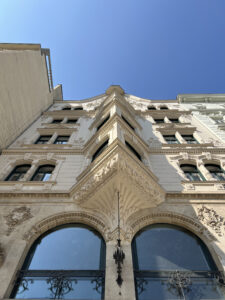
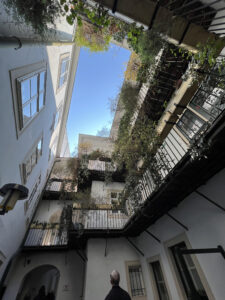
“I really enjoyed the architecture throughout Vienna. The Nationalbibliothek, Stephansdom, and Schönbrunn Palace were absolutely stunning, but what I loved most was wandering through the small streets and stumbling upon beautiful churches and colorful facades of beautifully constructed buildings.” (Amanda Sorensen)
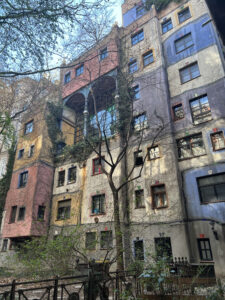
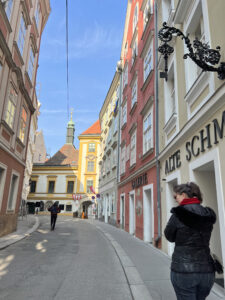
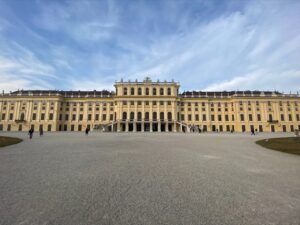 “Vienna was awesome. I have always heard and learned about how beautiful Vienna is, in class, movies, and books, but I they really don’t do it justice. Vienna took my breath away. It had a rich history with the Habsburgs and have a beautiful skyline and architecture. I really enjoyed trying traditional Wiener Schnitzel. What I enjoyed most of all, which came as a shocker to me, was the opera. The show was called
“Vienna was awesome. I have always heard and learned about how beautiful Vienna is, in class, movies, and books, but I they really don’t do it justice. Vienna took my breath away. It had a rich history with the Habsburgs and have a beautiful skyline and architecture. I really enjoyed trying traditional Wiener Schnitzel. What I enjoyed most of all, which came as a shocker to me, was the opera. The show was called “Die Entführung aus dem Serail.” Despite our not-so-great seats, I thought the opera was electric. Vienna really was an awesome excursion!” (Mac Tambussi)
“Die Entführung aus dem Serail.” Despite our not-so-great seats, I thought the opera was electric. Vienna really was an awesome excursion!” (Mac Tambussi)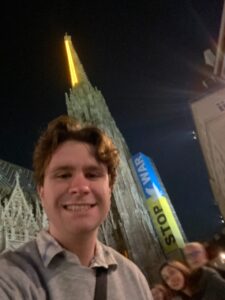
Photo credit: Durden Dickinson Bremen Program
To all Uni Bremen students: Our new scholarship flyer for the spring semester 2023 has arrived! On the flyer you can find all necessary information about our scholarship program between the University of Bremen and Dickinson College.
You can download the flyer here.
We are looking forward to your application!
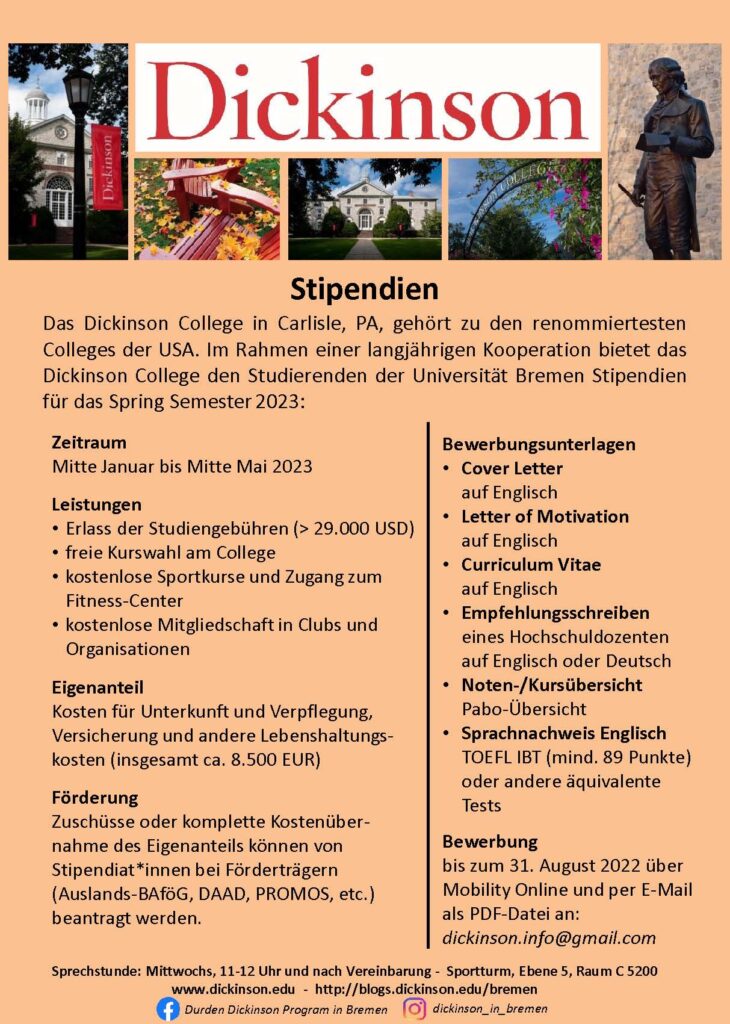
by Kathryn Baker ’23 and Nicholas Rickert ’23
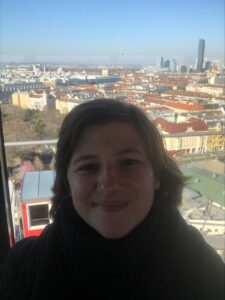 “My favorite part of our Wien excursion was exploring Prater Park! It is a large amusement park that is open 24 hours. One of the most famous landmarks in Wien is the Wiener Riesenrad (ferris wheel). We rode the Riesenrad and saw some of the most beautiful views of the city. After riding the Riesenrad, some of us walked around the park and got some food. I ate another Schokoapfel (apple covered in chocolate) and ice cream. I was surprised at how many ‘scary, haunted’ rides there were at Prater, there were at least five! Overall this is one of my favorite memories.” (Kathryn Baker)
“My favorite part of our Wien excursion was exploring Prater Park! It is a large amusement park that is open 24 hours. One of the most famous landmarks in Wien is the Wiener Riesenrad (ferris wheel). We rode the Riesenrad and saw some of the most beautiful views of the city. After riding the Riesenrad, some of us walked around the park and got some food. I ate another Schokoapfel (apple covered in chocolate) and ice cream. I was surprised at how many ‘scary, haunted’ rides there were at Prater, there were at least five! Overall this is one of my favorite memories.” (Kathryn Baker)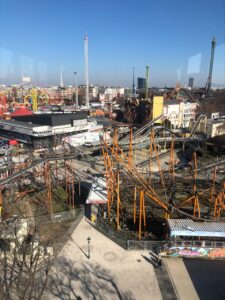
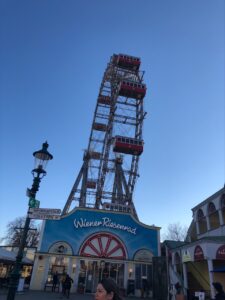
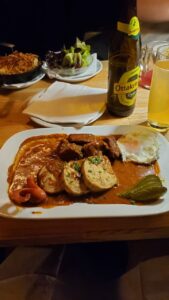 “Trying regional dishes and the enjoying unique local atmospheres in restaurants always leave me with positive and lasting impressions of a foreign city, and Vienna was no exception. Our group had the pleasure of being taken to dine in excellent traditional restaurants as well as Vienna’s famous ‘Cafe Demel,’ where I fell in love with a sweet dish called ‘Kaiserschmarrn’ which is like a pancake but much more delectable. Other highlights for me were the Viennese potato salad, Goulash, and of course Wiener Schnitzel. Combined with the lovely decor and a fine selection of beer, I don’t think I’ll be able to forget the restaurants!” (Nick Rickert)
“Trying regional dishes and the enjoying unique local atmospheres in restaurants always leave me with positive and lasting impressions of a foreign city, and Vienna was no exception. Our group had the pleasure of being taken to dine in excellent traditional restaurants as well as Vienna’s famous ‘Cafe Demel,’ where I fell in love with a sweet dish called ‘Kaiserschmarrn’ which is like a pancake but much more delectable. Other highlights for me were the Viennese potato salad, Goulash, and of course Wiener Schnitzel. Combined with the lovely decor and a fine selection of beer, I don’t think I’ll be able to forget the restaurants!” (Nick Rickert)
Photo credit: Durden Dickinson Bremen Program
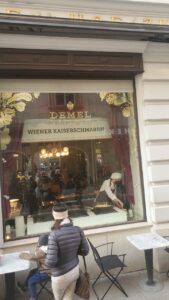
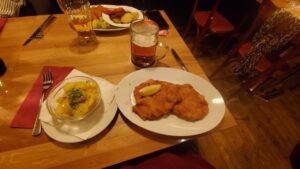
by Shannon Vogel ’23, Andrew Irvine ’23 and Evan Bates ’23
“The National Library was my favorite place we visited. The architecture and the amount of books felt straight out of a movie, and fit my dream image of the perfect library (complete with bookcase doors!) It was also interesting to learn that it was one of the first German language public libraries.” (Shannon)
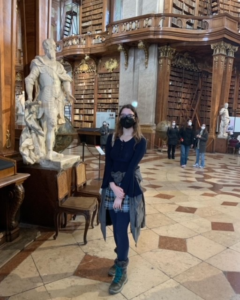
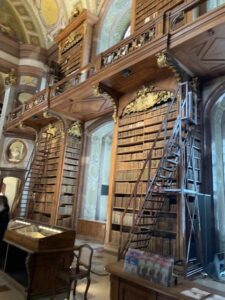
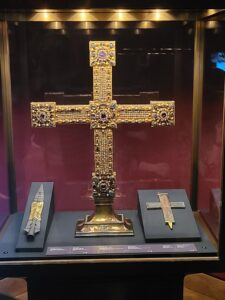 “On the first day of the excursion in Vienna, the group visited the Schatzkammer (Treasure Chamber) of Austria. Within the chamber lay centuries’ worth of priceless artifacts from various points of Austrian history. Some of the items included were coronation robes, tapestries, ceremonial swords with their sheaths, reliquaries of various saints and of religious items, and of course the crowns of various Holy Roman Emperors. Unfortunately, the Imperial Crown, believed to have been made for Otto I. (the Great) around 960 and later painted into a picture of the earlier Charlemagne (Karl der Große) who was crowned in 800, was off display for research purposes. Regardless, the treasures of Austria were an astounding journey through a millennium of history.” (Andrew)
“On the first day of the excursion in Vienna, the group visited the Schatzkammer (Treasure Chamber) of Austria. Within the chamber lay centuries’ worth of priceless artifacts from various points of Austrian history. Some of the items included were coronation robes, tapestries, ceremonial swords with their sheaths, reliquaries of various saints and of religious items, and of course the crowns of various Holy Roman Emperors. Unfortunately, the Imperial Crown, believed to have been made for Otto I. (the Great) around 960 and later painted into a picture of the earlier Charlemagne (Karl der Große) who was crowned in 800, was off display for research purposes. Regardless, the treasures of Austria were an astounding journey through a millennium of history.” (Andrew)
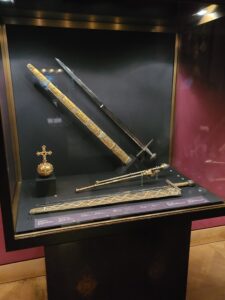
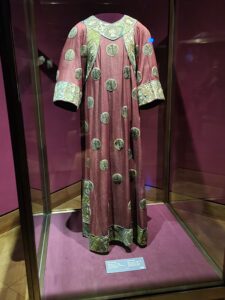
“One of my favorite attractions in Vienna might have been the Kaisergruft (the imperial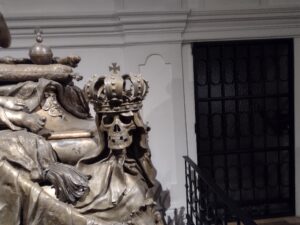 crypt of the Habsburg family). It was certainly odd to walk amongst the sarcophagi of ancient rulers but the sheer opulence and uniqueness of each coffin struck me. I think of all the decorations on the coffins, the skulls and figures were my favorite. They were wonderfully macabre, sometimes with wings or the cast crowns of their long since fallen domains. I was also quite interested in the fact that the family separated
crypt of the Habsburg family). It was certainly odd to walk amongst the sarcophagi of ancient rulers but the sheer opulence and uniqueness of each coffin struck me. I think of all the decorations on the coffins, the skulls and figures were my favorite. They were wonderfully macabre, sometimes with wings or the cast crowns of their long since fallen domains. I was also quite interested in the fact that the family separated 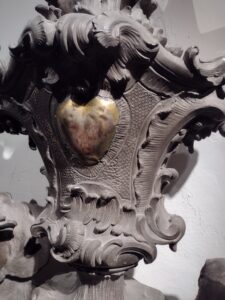 their organs to send to their family or original kingdom like the heart container in the picture here. The biggest coffin was for 2 rulers and was so large it had it’s own room and had to be lowered from the street above and the roof built above it. There are even modern burials here with one even from 2011 I believe. Certainly a lovely visit for those who love skulls and grim things. I heartily recommend.” (Evan)
their organs to send to their family or original kingdom like the heart container in the picture here. The biggest coffin was for 2 rulers and was so large it had it’s own room and had to be lowered from the street above and the roof built above it. There are even modern burials here with one even from 2011 I believe. Certainly a lovely visit for those who love skulls and grim things. I heartily recommend.” (Evan)
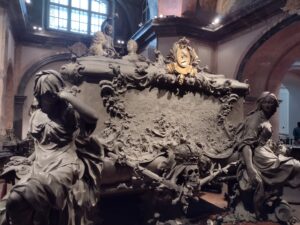
All pictures taken and provided by students or Dickinson staff.
by Peter Philips ’22
 I was recently accepted into the 2022-2023 Congress-Bundestag Youth Exchange (CBYX) for Young Professionals, a fellowship funded by the US Department of State and the German Bundestag that allows 75 American students the opportunity to spend a year in German to study both the German Language and their academic interests, complete an internship, and engage in cultural exchange. A close friend of mine and fellow exchange student from Vanderbilt University who participated in my 2020 spring semester abroad in Bremen, Molly Wells, is currently completing the fellowship and told me about the opportunity.
I was recently accepted into the 2022-2023 Congress-Bundestag Youth Exchange (CBYX) for Young Professionals, a fellowship funded by the US Department of State and the German Bundestag that allows 75 American students the opportunity to spend a year in German to study both the German Language and their academic interests, complete an internship, and engage in cultural exchange. A close friend of mine and fellow exchange student from Vanderbilt University who participated in my 2020 spring semester abroad in Bremen, Molly Wells, is currently completing the fellowship and told me about the opportunity.
In order to qualify for CBYX, an applicant must be a high school graduate, be between the ages of 18 and 24 1/2 by the time of the program’s start, have a desired career field, and be an American citizen. The requirements are set to allow applicants with a wide variety backgrounds to participate in the main directive of this program: citizen diplomacy. The 75 Americans part of each cohort act as cultural ambassadors to present to people in German academic institutions, workplaces, and community spaces the best, and brightest of young career-focused Americans regardless of their backgrounds.
With that mission in mind, I had to show the program coordinators when applying for the fellowship my commitment to citizen diplomacy and my professional direction. While CBYX does not require prior knowledge of German, my extensive knowledge of German showcases my ability to already effectively engage in cultural exchange with Germans. Additionally, my background in foreign languages and studying abroad similarly demonstrates my interest in general cross-cultural communication.
As for professional direction, I wrote on my application my intention to pursue a career in the historic preservation of architecture. Describing my past internships working at architectural history sites and my major in art history conveyed to the program coordinators my familiarity in the field. Demonstrating these qualities to the CBYX coordinators led to a successful application.
https://culturalvistas.org/programs/abroad/congress-bundestag-youth-exchange-young-professionals/
University of Bremen press release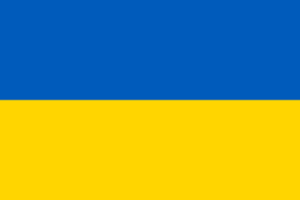
The University is reducing its ties to Russia to a minimum. At the same time, it declares its solidarity with Russian researchers who have written an open letter against the war in Ukraine. Additionally, there are offers of assistance for refugees.
“Our concern and sympathy goes out to all people affected by this war,” says President Bernd Scholz-Reiter of the University of Bremen. “Due to the Russian government’s belligerent and illegal attack of Ukraine, we see ourselves forced to reduce cooperations and collaborations with Russian scientific institutions to a minimum.” This means that currently active exchange programs will be frozen and no new ones initiated. However, contact will be maintained with Russian researchers. What will be significantly affected are the cooperations and collaborations with St. Petersburg State University, the Higher School of Economics, Belgorod State University (BELGU), and five other previous partner institutions in Russia. The university is acting in alignment with the recommendations made by the German Academic Exchange Service (DAAD) and the Alliance of Science Organizations in Germany.
The President thanks the Russian researchers who found clear words against the military attack on Ukraine in an open letter. “We declare our solidarity with them and remain in personal contact with many of them.” The letter was recently published on the internet. According to the Frankfurter Allgemeine Zeitung, more than 380 scientists had signed it within 24 hours. Among them are numerous members of the Russian Academy of Sciences, which is considered the most recognized research institution in the Russian Federation.
Cooperations with Ukraine
The University of Bremen maintains several cooperations with Ukrainian universities, colleges, and scientific institutions, including the Institute of Organic Chemistry at the Ukrainian Academy of Sciences, the Vadym Hetman National Economic University in Kyiv, the Odessa National Maritime University, and the Uman National University of Horticulture. “We stand by our partners,” says the President. There are numerous students and employees from Ukraine or with Ukrainian roots at the University of Bremen, with whom the university unites in solidarity.
Offers of Help
The university is in contact with Bremen Student Services Organization (Studierendenwerk Bremen) regarding the establishment of counseling services for its Ukrainian students and the possible intake of refugee students and scholars in the Student Services Organization’s apartments. The apartments for visiting scientists of the University of Bremen will also be made available.
In addition, the university will do everything in its power to offer refugee students from Ukraine follow-up opportunities in its degree programs. This is to already be made possible in the upcoming summer semester. The planned immediate recognition of Ukrainians as refugees will also allow prospective students to access HERE AHEAD (Academy for Higher Education Access Development) programs at Bremen’s state universities. The institution prepares international prospective students with and without a refugee background for studies in Bremen.
The full press release can be found here:
by Dr. Janine Ludwig
As part of the EUASA Conference Committee, it gives me great pleasure to announce that the 2022 EUASA conference will take place on February 10th and 11th, via Zoom. Please join the European Association for Study Abroad, for a virtual conference intended for study abroad professionals based in Europe (although anyone is welcome to join us!). More details and free registration information can be found through the link below. We look forward to seeing you there!
Conference Website: https://www.euasa.org/
Dr. Ludwig is offering a 4-class course titled “Peeks Into the German Psyche: What Germans Think About…”
This Global Experiences course explores some specific peculiarities of the historical German mindset on…
Dr. Janine Ludwig, our program’s academic director, just published a new article at University World News in which she discusses the future of international student exchange in light of the pandemic.
You can find the article here: https://www.universityworldnews.com/post.php?story=20220107151037200